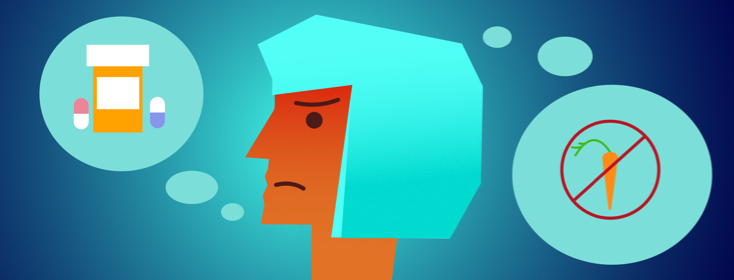Things That IBD'ers Worry About That Healthy People Don't
Life is hard and unfair in so many ways. But people living with inflammatory bowel disease seem to have a harder time with the hardships life has to offer simply because there is more to worry and think about.
Like normal, healthy people, Crohn’s disease and ulcerative colitis patients have to worry about keeping their jobs, paying their bills, feeding their families, maintaining a household, etc. Unlike healthy people, IBD’ers worry about a lot more. Here are five things you don’t have to think about if you have healthy bowels.
Medication
There are so many annoyances and concerns that come with having to maintain your disease with medication. You have to worry about how you’re going to afford it. Many maintenance medications can cost patients thousands of dollars per month! If you happen to find a program that will help you pay for your medicines, you have to get your insurance company, doctors, and pharmacies on the same page to make sure that you can get the discount you need. That’s a hassle in and of itself. Other medications require you to take them at a certain time every day for them to be effective. Many patients take upwards of 20+ pills a day!
Bowel habits
Something that I personally never thought about before getting sick was what happened in the bathroom. My poop, in other words. I honestly can’t remember the last time I had a good bowel movement. I don’t even remember what normal is supposed to look or feel like. Since my diagnosis in 2011, my guts have never been the same. Neither has my poop. I do remember when I realized I had to start paying attention. Before diagnosis, I dealt with diarrhea 20 times a day. I’d had diarrhea before, but until I started seeing pools of blood in the bottom of the toilet, I never worried about it much.
Food
Food is another thing I never really thought about. I wouldn’t say I had an unhealthy diet… I would actually argue that my eating habits before diagnosis were healthier. After being diagnosed with ulcerative colitis, I couldn’t eat veggies, fruit, or any other fibrous foods. Sometimes, it’s almost like just thinking about roughage will send me running to the bathroom. There was a time during my worst flare days that I would eat macaroni, potatoes, and donuts. Not healthy, but it didn’t kill me, either.
Bathroom location
It’s been a while since I’ve been able to physically “hold it.” I really miss those days. After being diagnosed, I’ve had many, many close calls from not being able to find a bathroom immediately. And, I hate to admit it, but I have actually had accidents from being unable to find a bathroom in time. One day, I pooped my pants on my way to work. IBD is absolutely the worst kind of hell you can imagine. I hate having to immediately locate a bathroom upon entering a place or plan out a trip around the location and/or quality of bathrooms.
Unsolicited health advice
Last, but certainly not least, healthy people never have to worry about the dreaded unsolicited health advice. We hate hearing about how your uncle’s friend’s brother’s sister-in-law “cured” her Crohn’s or UC with X, Y and/or Z. Usually, we have tried X, Y and/or Z and it didn’t work for us. IBD is so different and the treatments vary from patient to patient. What works for one patient may not work for another. As patients with chronic illness, we are doing everything we can to find relief and the best treatment. It really frustrates us when people who know nothing about our diseases try to tell us what we ought to be doing. We know our bodies much better than you do, thank you very much.

Join the conversation